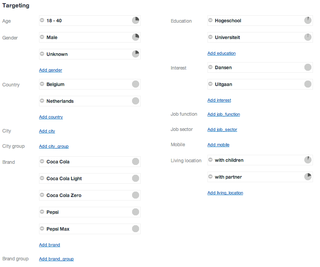
Neopets is a free-to-play virtual pet browser game. First launched in 1999, the game allows users to own virtual pets ("Neopets") and explore a virtual world called "Neopia." Players can earn one of two virtual currencies. One currency, called Neopoints, can be obtained for free through on-site features like games, events, and contests. The other, Neocash (NC), is purchased with real-world money and can be exchanged for wearable items for pets.

LiveJournal, stylised as LiVEJOURNAL, is a Russian-owned social networking service where users can keep a blog, journal, or diary. American programmer Brad Fitzpatrick started LiveJournal on April 15, 1999, as a way of keeping his high school friends updated on his activities. In January 2005, American blogging software company Six Apart purchased Danga Interactive, the company that operated LiveJournal, from Fitzpatrick.

Friendster is a social networking service originally based in Mountain View, California, founded by Jonathan Abrams and launched in March 2003. Before Friendster was redesigned, the service allowed users to contact other members, maintain those contacts, and share online content and media with those contacts. The website was also used for dating and discovering new events, bands, and hobbies. Users could share videos, photos, messages, and comments with other members via profiles and networks. It is considered one of the original social networking services.
Digital display advertising is online graphic advertising through banners, text, images, video, and audio. The main purpose of digital display advertising is to post company ads on third-party websites. A display ad is usually interactive, which allows brands and advertisers to engage deeper with the users. A display ad can also be a companion ad for a non-clickable video ad.
Myspace is a social networking service based in the United States. Launched on August 1, 2003, it was the first social network to reach a global audience and had a significant influence on technology, pop culture and music. It also played a critical role in the early growth of companies like YouTube and created a developer platform that launched the successes of Zynga, RockYou, and Photobucket, among others. From 2005 to 2009, Myspace was the largest social networking site in the world.
Online advertising, also known as online marketing, Internet advertising, digital advertising or web advertising, is a form of marketing and advertising that uses the Internet to promote products and services to audiences and platform users. Online advertising includes email marketing, search engine marketing (SEM), social media marketing, many types of display advertising, and mobile advertising. Advertisements are increasingly being delivered via automated software systems operating across multiple websites, media services and platforms, known as programmatic advertising.

YouTube is an online video sharing platform owned by Google. YouTube was founded on February 14, 2005, by Steve Chen, Chad Hurley, and Jawed Karim, three former employees of PayPal. Headquartered in San Bruno, California, United States, it is the second-most visited website in the world, after Google Search. In January 2024, YouTube had more than 2.7 billion monthly active users, who collectively watched more than one billion hours of videos every day. As of May 2019, videos were being uploaded to the platform at a rate of more than 500 hours of content per minute, and as of 2021, there were approximately 14 billion videos in total.

Facebook is a social media and social networking service owned by American technology conglomerate Meta. Created in 2004 by Mark Zuckerberg with four other Harvard College students and roommates Eduardo Saverin, Andrew McCollum, Dustin Moskovitz, and Chris Hughes, its name derives from the face book directories often given to American university students. Membership was initially limited to Harvard students, gradually expanding to other North American universities. Since 2006, Facebook allows everyone to register from 13 years old, except in the case of a handful of nations, where the age limit is 14 years. As of December 2022, Facebook claimed almost 3 billion monthly active users. As of October 2023, Facebook ranked as the third-most-visited website in the world, with 22.56% of its traffic coming from the United States. It was the most downloaded mobile app of the 2010s.

Vuze is a BitTorrent client used to transfer files via the BitTorrent protocol. Vuze is written in Java, and uses the Azureus Engine. In addition to downloading data linked to .torrent files, Azureus allows users to view, publish and share original DVD and HD quality video content. Content is presented through channels and categories containing TV shows, music videos, movies, video games, series and others.
Facebook has been the subject of criticism and legal action since it was founded in 2004. Criticisms include the outsize influence Facebook has on the lives and health of its users and employees, as well as Facebook's influence on the way media, specifically news, is reported and distributed. Notable issues include Internet privacy, such as use of a widespread "like" button on third-party websites tracking users, possible indefinite records of user information, automatic facial recognition software, and its role in the workplace, including employer-employee account disclosure. The use of Facebook can have negative psychological and physiological effects that include feelings of sexual jealousy, stress, lack of attention, and social media addiction that in some cases is comparable to drug addiction.

Targeted advertising is a form of advertising, including online advertising, that is directed towards an audience with certain traits, based on the product or person the advertiser is promoting.
Sonico was a free-access social networking service oriented toward a Latin American audience.

Social media marketing is the use of social media platforms and websites to promote a product or service. Although the terms e-marketing and digital marketing are still dominant in academia, social media marketing is becoming more popular for both practitioners and researchers.
Disqus is an American blog comment hosting service for websites and online communities that use a networked platform. The company's platform includes various features, such as social integration, social networking, user profiles, spam and moderation tools, analytics, email notifications, and mobile commenting. It was founded in 2007 by Daniel Ha and Jason Yan as a Y Combinator startup.

Instagram is an American photo and video sharing social networking service owned by Meta Platforms. It allows users to upload media that can be edited with filters, be organized by hashtags, and be associated with a location via geographical tagging. Posts can be shared publicly or with preapproved followers. Users can browse other users' content by tags and locations, view trending content, like photos, and follow other users to add their content to a personal feed. A Meta-operated image-centric social media platform, it is available on iOS, Android, Windows 10, and the web. Users can take photos and edit them using built-in filters and other tools, then share them on other social media platforms like Facebook. It supports 32 languages including English, Hindi, Spanish, French, Korean, and Japanese.

Pinterest is an American social media service for publishing and discovery of information in the form of pinboards. This includes recipes, home, style, motivation, and inspiration on the Internet using image sharing. Pinterest, Inc. was founded by Ben Silbermann, Paul Sciarra, and Evan Sharp, and is headquartered in San Francisco.

Multiply was a social networking service with an emphasis on allowing users to share media – such as photos, videos and blog entries – with their "real-world" network. The website was launched in March 2004 and was privately held with backing by VantagePoint Venture Partners, Point Judith Capital, Transcosmos, and private investors. Multiply had over 11 million registered users. The company was headquartered in Boca Raton, Florida but moved to Jakarta, Indonesia early in 2012 and recently announced intentions to switch to e-commerce, dropping the social networking aspect entirely. Quantcast estimates Multiply had 2.47 million monthly U.S. unique visitors at their peak on July 30, 2012.

Ekhanei or ekhanei.com was a mobile-based online marketplace classified advertisements website of buying and selling property, gadgets, vehicles and personal items for sale. Tickets and jobs are also posted among other things. Starting in 2006 as CellBazaar, it was the first online free classified ads website in Bangladesh. By Alexa Internet ranking, as of August 2015, it was the top shopping site and the fifth business and economy website in Bangladesh. In 2017 the parent company announced to shutdown it.

OLX Group is a Dutch-domiciled online market place headquartered in Amsterdam. The OLX consumer brand originated as OnLine eXchange in 2006. OLX Group is owned by Prosus, the international assets division of Naspers.

The fediverse is a collection of social networking services that can communicate with each other using a common protocol. Users of different websites can send and receive status updates, multimedia files and other data across the network. The term fediverse is a portmanteau of "federation" and "universe".













